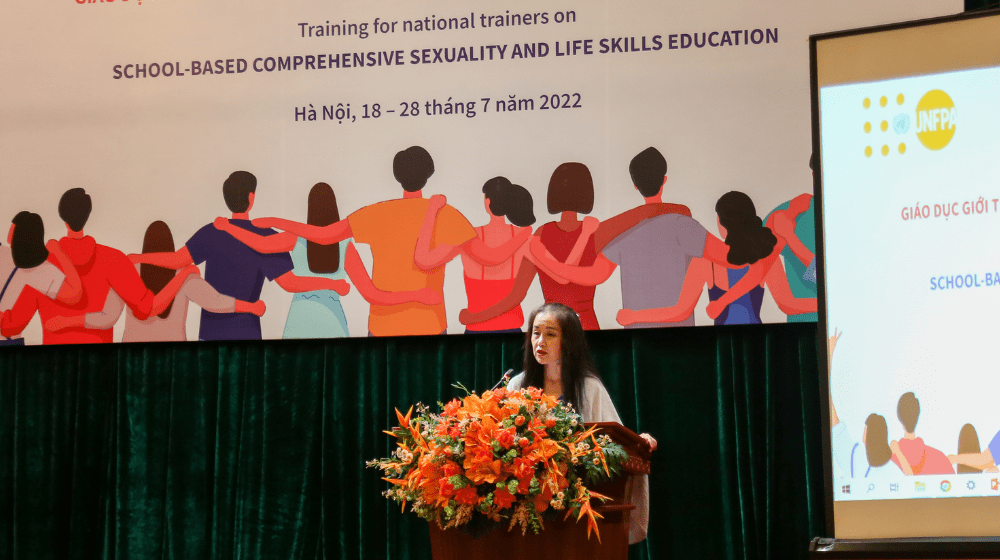Mr. Vu Minh Duc, Director of the Department of Teachers and Education Administrators, Ministry of Education and Training;
Lecturers from the pedagogical departments of universities, the National Youth Academy, and the Education Science Research Institute;
My colleagues from UNFPA and UNESCO;
I am very pleased to be here today for the opening of the Training of Trainers on comprehensive sexuality and life skills education. On behalf of UNFPA and UNESCO in Viet Nam, I would like to sincerely thank the Ministry of Education and Training (MOET) for co-organizing this training to provide national trainers with knowledge and teaching skills on Comprehensive Sexuality Education (CSE) and Life Skills Education (LSE).
According to the 2019 Population and Housing Census, Viet Nam recorded the highest proportion of young people in the country’s history, creating the potential for a demographic dividend to accelerate socio-economic growth. Viet Nam’s 20.4 million young people aged 10 – 24, accounted for 21 per cent of the total population. The demographic window of opportunity, which was first identified in 2007, is projected to last until 2041, presenting Viet Nam with a unique opportunity to advance sustainable development.
Today, evidence shows that Vietnamese young people are sexually active at an earlier age. This highlights the importance of meeting their need for information and services in sexual and reproductive health.
The SDGs survey conducted by Viet Nam’s General Statistic Office in 2021 in collaboration with UNFPA and UNICEF showed that only 72.2% of married women are satisfied with modern contraceptives, and this percentage even drops further to 50.3% for unmarried women. The problem seems to be acute among young people, whose unmet need for family planning is estimated 4 times higher than married women (10% vs. 40% respectively).
Dear participants,
According to a national survey on Sexual and Reproductive Health (SRH) conducted in 2016, Vietnamese adolescents and youth had poor knowledge on SRH issues. For instance, only 26% knew how to use condoms correctly and only 27% had comprehensive and accurate knowledge about HIV/AIDS[1]. It is against this background that we are advising on the availability of CSE and LSE in schools including vocational training centers, colleges, and universities, so that Viet Nam’s young people are able to make informed and responsible decisions about their health, and about their life, including if, when, and with whom they can start a family, while balancing it with educational and professional career paths.
Dear participants,
We highly appreciate the commitment of MOET in its approval in 2019 of school – based CSE curriculum and the guidelines for teaching CSE and LSE. And in this context, it is essential that skilled trainers are made available to ensure the effective implementation and delivery of such educational tools to each student, and it is the intent of this 10-day training workshop.
I am happy to see the commitment of the Ministry of Home Affairs, the Ministry of Education and Training, and other implementing partners to ensure that young people's right to sexual and reproductive health is respected. Equipping young people with essential knowledge on CSE and LSE will empower them in shaping their lives in the way they want. That means that we can reduce risky behaviors of adolescents and youth, while promoting positive, responsible and mature approaches to life.
I look forward to working closely with all of you in support for Vietnamese young people, which is essential for the achievement of SDGs. Let us join hands to place adolescents and youth at the center of the national development and assure no one is left behind.
Thank you for your participation and I wish you a fruitful and productive training.
[1] UNFPA, (2017), Op. Cit.




